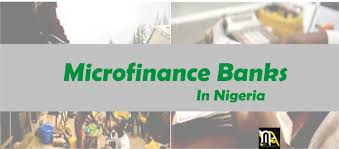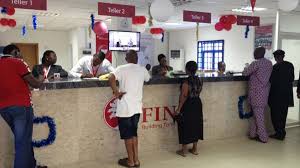![]()
If you’ve landed on this article page, you’re probably searching for a
good business idea—an idea that’s light on the pocket but heavy on
returns, promising both a fulfilling journey and potential profit.
|
How to start a Micro Finance Bank in
Nigeria
Generally put, a microfinance bank in Nigeria is a category of
financial institutions targeted at individuals and small
businesses who lack access to conventional banking and related
services. Microfinance includes microcredit, the provision of
small loans to poor clients, savings and checking accounts,
micro insurance, and payment systems, among other services.
Who is eligible to set up a Microfinance Bank?
Microfinance bank can be established by individuals, groups of
individuals, community development associations, private
corporate entities or foreign investors subject to a maximum of
49% shareholding for individuals and aggregate related parties.
Who are the target clients of a Microfinance Bank?
Generally, MFBs target the following group of persons: The
economically active poor; Low-income households; The un-banked
and underserved people, particularly vulnerable groups such as
women, youths and the physically challenged; and Informal sector
operators, micro-entrepreneurs and subsistence farmers.
Microfinance banks like other commercial banks are regulated by
the Central Bank of Nigeria. The CBN periodically releases
guidelines and regulations for banks with relation to their
registration, licensing, operation and administration. All
financial institutions intending to operate in Nigeria are
required to be licensed by the CBN.
Microfinance bank license in Nigeria is obtained from the
Central Bank of Nigeria for the carrying on banking services on
a small scale. It is a niche targeted at individuals who would
not ordinarily have access to finance through the conventional
banking system. Like the name implies it provides finance on a
micro scale.
Who are the target clients of a Microfinance Bank?
Functions of a Microfinance Bank
For the avoidance of doubt, MFBs being a category of banks, are
allowed to carry out the following activities according to the
CBN guideline:
Provision of credit, housing micro loans, ancillary services
such as capacity building on record keeping and small business
management and safe custody to its customers;
Collection of money or proceeds of banking instruments on behalf
of its customers including clearing of cheques through
correspondent banks;
Act as agent for the provision of mobile banking, micro
insurance and any other services within the geographic coverage
of its license;
Provision of payment services such as salary, gratuity, pension
for employees of the various tiers of government;
Provision of loan disbursement services for the delivery of the
credit programme of government, agencies, groups and individual
for poverty alleviation on non-recourse basis;
Maintenance and operation of various types of account with other
banks in Nigeria;
Financing agricultural inputs, livestock, machinery and
industrial raw materials to low- income persons; and
Provide financial and technical assistance and training to
microenterprises.
Categories of Microfinance Banks
For the purpose of obtaining a CBN license to operate a
microfinance bank, there are four categories of MFBs an
applicant may apply for. They are:
Tier 1 Unit MFB:
A Unit Microfinance Bank with urban authorization (Tier 1) is
authorized to operate in the banked and high-density areas, and
is allowed to open not more than four (4) branches outside the
head office within five (5) contiguous Local Governments Areas,
subject to the approval of the CBN.
Tier 2 Unit MFB:
A Unit Microfinance Bank with rural authorization (Tier 2) is
authorized to operate only in the rural, unbanked or under
banked areas, and is allowed to open one branch outside the head
office within the same Local Government Area subject to the
approval of the CBN.
A State Microfinance Bank is authorized to operate in one State
or the Federal Capital Territory (FCT). It is allowed to open
branches within the same State or the FCT, subject to prior
written approval of the CBN for each new branch or cash centre.
It cannot open more than two branches in the same Local
Government Area (LGA) unless it has established at least one
branch or cash centre in every LGA of the State. A newly
licensed State MFB is not permitted to commence operations with
more than ten (10) branches.
National Microfinance Bank:
A National Microfinance Bank is authorized to operate in more
than one State including the FCT. A newly licensed National MFB
is not permitted to commence operations with more than ten (10)
branches.
TYPES OF MFBS
MFBs are regulated by the CBN and are divided into 3 categories.
Unit MFBs1 are licensed to operate in only one location and
cannot have branches or cash centres. The minimum share capital
for a Unit MFB is ₦200,000,000 (Two Hundred Million Naira).
State MFBs can only operate within a particular state and can
open multiple branches and cash centres within the state subject
to prior approval from the CBN. An MFB with state-wide spread
must have a minimum of ₦1,000,000,000 (One Billion Naira) share
capital.
Licensing Procedure
Submission of application for grant of MFB license with the
required documents.
An Approval-in-Principle (AIP) is then granted by the CBN on
receipt of the application and after being satisfied with the
overall quality of the proposal within three (3) months.
The grant of the AIP is a condition precedent for registration
at the CAC. When this is done, the incorporation process would
be concluded at the CAC (NB: Name must end with Microfinance
Bank).
An MFB with AIP will then be granted a final operating license
upon the submission of the required documents such as the
incorporation documents, share certificates of the shareholders,
membership register and opening statement of affairs (NB: Before
the MFB can begin operations, the CBN will conduct a physical
inspection of its premises).
The regulatory requirements to establish an MFB might be too
onerous for a startup with limited funding. Typically, startups
alleviate funding problems by entering into Service Level
Agreements, Partnership Agreements or other similar agreements
with existing MFBs to use their licence for operations.
Subsequently, the startup can then establish or acquire its own
MFB after scaling and attracting significant funding.
Get our Practical Training guide on How to set up a Micro
Finance Bank in Nigeria., the guide provides a detailed roadmap
for entrepreneurs seeking to dive into the Finance
industry . The plan offers an in-depth analysis of
essential commercial elements, equipping you with actionable
insights to build a robust foundation for your venture. It
addresses business planning, operations, marketing,
organizational structure, and finance and outlines how to
effectively manage them. Moreover, the document includes a
detailed financial model crucial for attracting investors to set
up your Micro Finance Bank
|







